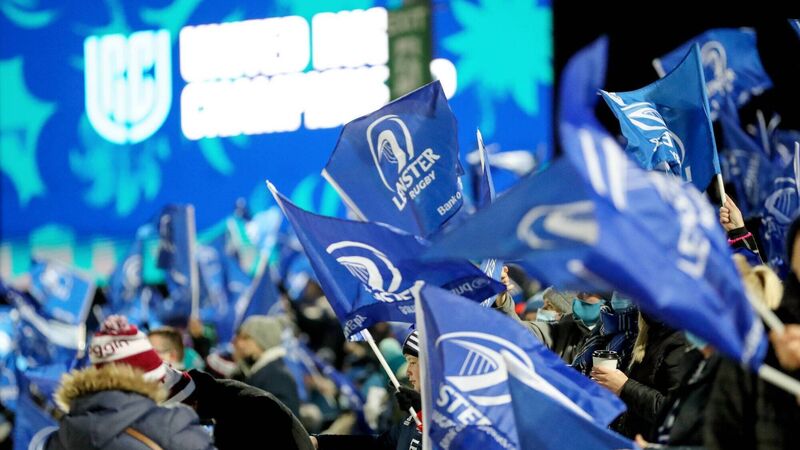Ian Mallon: Leinster tackling rugby's reliance on ticket sales

NEW AVENUES: In 2019, approximately 60 percent of all revenue at Leinster came through its ticket office.
BEFORE Covid hit, Leinster Rugby was already concerned about ticketing revenue.
Not that there was any problem with the approximately €9m it earns the organisation each season, rather just how dependent the brand had become on match day income above all other streams.
In 2019, the last full year of normal sports attendances before the pandemic, approximately 60 per cent of all revenue at Leinster came through its ticket office.
During the same period in football, Europe’s top three leading clubs (Deloitte Football Money League 2020) - Barcelona, Real Madrid and Manchester United - reported match-day revenues at 19% of overall income.
Obviously broadcast and commercial revenue for soccer is considerably higher than ‘Union, but even still - Leinster knew it needed to reduce its dependency, while still increasing ticket sales, but also by growing other business.
“Basically we identified that rugby and Leinster Rugby had an overreliance on match day ticket sales to balance the books,” Kevin Quinn, Head of Commercial & Marketing told The Pitch.
“Ticket sales for highly successful sporting organisations aren’t necessarily a false economy during good times.
“But what Covid did was demonstrate that through extraordinary events and even fallow periods of success, the reliance and emphasis on ticket sales is highlighted.”
The impact of that strategic rethink and a diversification of revenue streams has reduced that reliance by 10%, to approximately half of all income, even in the wake of a current forecast-beating pre-season sales period.
“Leinster Season Tickets went on sale at the end of February and we’re delighted to confirm that we’ve beaten our sales target, ahead of our forecasts with a fantastic response from holders and new season ticket holders,” said Quinn.
That number is 12,800 approximately with hopes of further sales ahead of the first URC home game of the season v Benetton at the RDS on September 22, when new facilities and greater options will be presented to fans.
With the ‘assistance’ of the supporterless period of the pandemic, the organisation adjusted commercially in real time, developing new sponsorship streams and it will increase the strong suite of sponsors already on board in the weeks ahead.
Part of the strategic adjustment will also see a stronger emphasis on the global brand of Leinster Rugby, no longer entrenched in the leafy environs of South Dublin.
“A detailed brand development initiative enabled us to put in the groundwork to start developing and promoting the Leinster Rugby brand beyond our core audience and core community in the 12 counties of Leinster, as a priority, and to then engage with key ex-pat communities in London and the US East Coast, for example.”
Despite the growth of the Leinster brand to the €18m revenue driver it is today, the province will endure seismic change in the season ahead, with the departure of club stalwart Mick Dawson.
The colourful CEO has been an ever-present with Leinster for 21 years, and his departure is one which Kevin Quinn says will be felt across the organisation.
“Mick’s a one-of-a-kind, a great operator, very quick to analyse a situation and typically arrive at the right answer for Leinster Rugby.
“He has a great gut reaction on what’s right and wrong, ‘very transparent, and he knows the organisation inside and out.”
Shane Nolan will formally take over from Dawson in November coming from Google where he was managing director, with experience of building new business for the tech operator in overseas markets.
“Shane too seems like a really good guy - so a big culture shift moving from Google to Leinster Rugby but he also has significant small business experience and growing small businesses which is what I believe Leinster needs to move onto the next level.”
Dawson will leave the organisation on the cusp of a second consecutive year of financial success, with the club set to report a break-even performance for the year.
Quinn is under no doubt that such foundations mean even better times lie ahead for Leinster, even on the back of sporting devastation last May with that defeat to Ronan O’Gara’s La Rochelle in Marseilles.
That loss in particular, coming as it did so late in the game and denying Leinster a fifth European championship, was felt throughout the organisation for some time.
“The atmosphere in the building (at Leinster’s UCD HQ) the following week was low, everyone was low, the players, staff - this is sport and so we’ve an emotional attachment with what we do.
“Only with time can you look back and in the context of everything that was achieved to beat our commercial targets, and recognise and take great satisfaction in the fantastic work effort from everyone throughout a very challenging season.”
Leinster open their United Rugby Championship campaign away to Zebre on Saturday.
SIX months ago The Pitch warned that the Government’s search for a world class betting regulator - one with industry expertise and experience - was destined to underwhelm.
And so it came to pass with the announcement in recent days that the most powerful force in gambling had gone to a mid-ranking civil servant whose only related experience was with the Residential Tenancies Board.
Anne Marie Caulfield is undoubtedly an impeccable professional and public servant, and is someone we are told who has overseen "several research publications and a suite of ICT projects".
It is to her immense credit that she has landed a job as powerful and industry-influencing as the role of CEO of the Gambling Regulatory Authority.
Appointing a public officer to a position which should require the technical expertise needed to navigate the digital and algorithmic world of gambling is a novel approach, even by the standards of public appointment.
What Gambling Regulation will now look like will be a kind of marketing and advertising censorship administration, where ads will be banned pre-watershed, and where sponsorship of media and sporting assets will end.
All the really obvious pieces of work without any of the deep technological knowhow on how betting companies lure problem gamblers into the darker areas of the web.
It’s here, in the casino rooms and live betting suites, where the real threats to problem gamblers lurk at their most divisive, where the compulsive gamblers fall prey to reactive rapid-fire encouragement and ‘opportunity’.
Bet on a number, who’ll take the most shots?, the first yellow card, most corners, shots on target and so on - the micro bets that feed the addiction.
The Regulator should be knowledgeable about the algorithmic profiling used to target these troubled gamblers, and ideally they should have knowledge of how these crafty strategies are subliminally presented.
A CEO of gambling protection also needs to understand that there are hundreds of thousands of safe gamblers who also need responsible regulation to protect them from devious tactics.
Will the Regulator take steps to outlaw behaviours employed by big betting brands to ban successful punters - those who win - or will she monitor price-fixing by betting companies now free to make up their own odds in horse racing?
But what’s to say that the new Regulator won’t surround herself with the best industry talent and depend on them for their expertise and guidance?
This is unlikely on two fronts.
The first is budget. The salary for the CEO is set at €145k and anyone taking up one of the 100 positions within the new office will be paid mid-ranking rates, which will not lure betting industry specialists.
The second reason is that this is now looking like a quango - and history tells us that quangos are occupied by civil servants and not by outsiders or experts with private sector experience.
The biggest disappointment is that this much-needed journey towards gambling regulation has already taken a turn up a blind alley of bureaucracy and public appointment.
The speed at which it found such an obvious route is the greatest concern.
ANTHONY JOSHUA’S fight Tyson Fury in December for the WBC Heavyweight World Title is set to be the biggest PPV bout in British boxing history.
While the match-up would have even greater appeal if Joshua had titles to trade with Fury’s WBC belt, it still promises to be a massive draw for fight fans.
But where will it sit within the most lucrative PPV fights in history?
With the help of World Sports Weekly here are the Top 10 Highest Grossing Fights of All Time.
10. Evander Holyfield-George Foreman, 1991 (PPV Buys 1.45m, PPV Revenue $80m)
9. Mike Tyson-Roy Jones Jr, 2020 (PPV Buys 1.65m, PPV Revenue $80.5m)
8. Floyd Mayweather v Miguel Cotto, 2012 (PPV Buys 1.5m, PPV Revenue $94m)
7. Mike Tyson v Peter McNeely, 1995 (PPV Buys 1.55m, PPV Revenue $96m)
6. Mike Tyson-Evander Holyfield II, 1997 (PPV Buys 1.99m, PPV Revenue $100.2m)
5. Mike Tyson-Lennox Lewis, 2002 (PPV Buys 1.95m, PPV Revenue $112m)
4. Floyd Mayweather-Oscar De La Hoya, 2007 (PPV Buys 2.48m, PPV Revenue $136m)
3. Floyd Mayweather-Canelo Alvarez, 2013 (PPV Buys 2.2m, PPV Revenue $150m)
2. Floyd Mayweather-Conor McGregor, 2017 (PPV Buys 4.3m, PPV Revenue $396m)
1. Floyd Mayweather-Manny Pacquiao, 2015 (PPV Buys 4.6m, PPV Revenue $410m)








